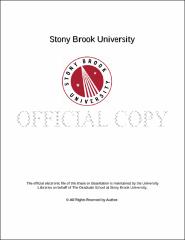The Human to Come: Representations of Human in Literary Modernity’s Testimonial "I"
The Human to Come: Representations of Human in Literary Modernity’s Testimonial "I"
| dc.identifier.uri | http://hdl.handle.net/11401/77523 | |
| dc.description.sponsorship | This work is sponsored by the Stony Brook University Graduate School in compliance with the requirements for completion of degree. | en_US |
| dc.format | Monograph | |
| dc.format.medium | Electronic Resource | en_US |
| dc.language.iso | en_US | |
| dc.publisher | The Graduate School, Stony Brook University: Stony Brook, NY. | |
| dc.type | Dissertation | |
| dcterms.abstract | With the concern for human rights always present to this project, I explore in the initial chapters the precariousness of the first-person singular subjective “I†in both testimonial and fictional texts and its bearing on human rights. In practice, first-person narratives, whether as life-writing or fictional, are textual spaces in which writers’ concerns that deal with human conditions are frequently articulated. By examining the first-person narrative function in selected texts of Gertrude Stein, Virginia Woolf, James Baldwin, and Samuel Beckett, this dissertation shows how conceptual imaginings of the concept of the human and human embodiment are unsettled. These exemplar modernist writers magnify the existing problems of representation and referentiality, to varying degrees, and challenge the assumption that words and their referents are inherently linked, thus destabilizing the concept of the human and the “I†that represents it. Through stylized hyperboles of the “self†and the “I†that represents it, as well as their deliberate misuse of genres, which ultimately break the genre rules, Stein, Woolf, Baldwin and Beckett, help illuminate the figure I call, the human to come. This project, then, asks the following questions: How does the Testimonial “I,†a metonymic representation for the human, point to the impossibility of arresting and stabilizing a universal definition of human? And without a fixed definition of human, how, then, are human rights even possible? What conditions must be satisfied to be included as bearer of human rights? After having explored the chasm opened by representations of the human through the first-person narrative “I,†the final chapter of this monograph and its conclusion proposes that the discourse, procedures and laws that shape current human rights projects are based on certain Western notions of the human that ultimately (at best) discourage and (at worst) prevent new and unfamiliar forms of bearing witness. Human rights for the human to come opens a space for radically unfamiliar calls from potentially new kinds of subjects also affected by injuries, crimes and catastrophes. | |
| dcterms.available | 2017-09-20T16:52:51Z | |
| dcterms.contributor | Kaplan, Elizabeth A | en_US |
| dcterms.contributor | Haralson, Eric | en_US |
| dcterms.contributor | Johnston, Justin O | en_US |
| dcterms.contributor | Harvey, Robert. | en_US |
| dcterms.creator | Spooner, Kerry Suzanne | |
| dcterms.dateAccepted | 2017-09-20T16:52:51Z | |
| dcterms.dateSubmitted | 2017-09-20T16:52:51Z | |
| dcterms.description | Department of English | en_US |
| dcterms.extent | 212 pg. | en_US |
| dcterms.format | Monograph | |
| dcterms.format | Application/PDF | en_US |
| dcterms.identifier | http://hdl.handle.net/11401/77523 | |
| dcterms.issued | 2016-12-01 | |
| dcterms.language | en_US | |
| dcterms.provenance | Made available in DSpace on 2017-09-20T16:52:51Z (GMT). No. of bitstreams: 1 Spooner_grad.sunysb_0771E_13033.pdf: 1266990 bytes, checksum: 9ee0a6abd7d9d363f0a707d688e561c1 (MD5) Previous issue date: 1 | en |
| dcterms.publisher | The Graduate School, Stony Brook University: Stony Brook, NY. | |
| dcterms.subject | Modern literature -- Philosophy -- English literature | |
| dcterms.subject | Gertrude Stein, Human Rights, James Baldwin, Philosophy, Samuel Beckett, Virginia Woolf | |
| dcterms.title | The Human to Come: Representations of Human in Literary Modernity’s Testimonial "I" | |
| dcterms.title | The Human to Come: Representations of Human in Literary Modernity’s Testimonial "I" | |
| dcterms.type | Dissertation |

